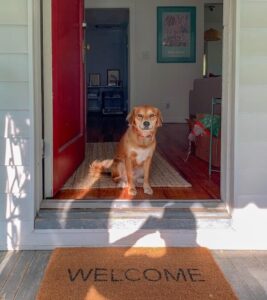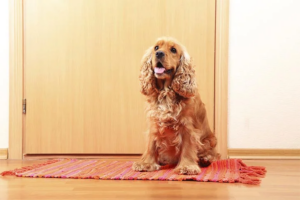Learn how to teach your dog not to run through the front door! Not teaching your dog door boundaries can be a life or death scenario! Every year, many dogs run away and get hit by cars! In order to keep your dog safe, you need to work on door boundaries/manners, and we utilize a process called claiming space.
Claiming space uses natural body language that dogs understand! Claiming space is essentially teaching a dog they need to leave an area or a certain item/area is not theirs. The name of the game here is control! In this video, we cover all of the main uses for claiming space around the front door! Claiming space also has a ton of other uses, such as keeping your dog out of certain rooms, claiming food, and many more!
Just like everything in dog training, we recommend starting with a solid foundation of heel walks and obedience. This process can be taught without these skills, but the more well-trained and obedient your dog is, the easier this process becomes! Out of all of our training techniques we can employ, this exercise works with more dogs, and works faster than any other. Take a couple of minutes and study up and give it a try; you will be amazed!
What is "Claiming Space" and how is it used?
The "claiming space" technique emphasizes the importance of teaching dogs impulse control and respecting personal space. It is incredibly intuitive for the dog, creating harmony and clear communication for all involved. By setting clear expectations and providing guidance, dog owners can instill good manners and prevent potential door-related issues, such as escape attempts, jumping on guests, or excessive barking.
Understanding and interpreting body language is an essential aspect of effective dog training. Dogs primarily communicate through non-verbal cues, making their body language a crucial indicator of their thoughts, emotions, and intentions. By closely observing a dog's posture, facial expressions, tail position, and overall demeanor, trainers can gain valuable insights into the dog's state of mind. This allows trainers to adjust their approach, provide appropriate feedback, and tailor their training methods to suit the individual dog's needs.
In turn, being mindful of our own body language and ensuring consistency between our verbal and non-verbal cues helps establish clear communication and builds trust between the trainer and the dog. The Claiming Space exercise is exactly this: using body language and vocalizing to communicate with your dog that the door belongs to you, and they only get to use it with your permission.
By paying attention to and respecting a dog's body language, trainers can create a positive and effective training environment that fosters understanding, cooperation, and successful outcomes.
We use claiming space at the front door rather than obedience for a few reasons!
Often, doors get left open by kids or guests, and we want our dog to respect the door boundary without a command needing to be given. Your dog should learn to respect you and what you want out of them!
This exercise is typically picked up very quickly and requires little to no other training to begin working on the problem. We want dogs to behave well naturally without needing commands. This method of teaching your expectations of them while at the front door is a great way to get your dog to give you space without taking the time to give commands.
How do you use Claiming Space at the front door to teach manners?
- We want to begin this exercise with a leash and collar on and us holding the leash. Walking up to the door, but not in front of it, we want to slowly open it. As soon as your dog moves to exit, you give a corrective noise and move to block their path.
- If they try to move around you, keep moving and blocking you. What we want to see is the dog either sit down or backpedal; once you see this, then you can resume moving out of the way and opening the door.
- When you're satisfied that your dog is doing well, it's time to make the exercise more difficult. Start by dropping the leash and repeating all the steps until consistently doing well.
- Once your dog understands the basics, it is time to make things more difficult! The end goal is to have a dog that will not run out of the door unless they are told to! This is handy for pizza deliveries, Amazon packages, or even carrying in groceries!
- Slowly work up to more and more difficult distractions. Next, try using a toy like in the video and throwing it outside. Repeat with food, a favorite family member coming home, another dog, basically; anything you think would get them excited.
- When your dog has mastered all of these, then it's time to practice all of those steps again with the leash and collar off.
Remember, patience, consistency, and positive reinforcement are key elements of successful training. Gradually increasing the level of difficulty and distractions can help dogs generalize the desired behavior and apply it in various scenarios. Additionally, it is essential to tailor the training approach to each individual dog, considering their personality, temperament, and specific needs.
If you're having issues with excitability with visitors at the front door, check out of video below!
Conclusion
In conclusion, "claiming space" is a highly effective technique for teaching front door manners to dogs. By implementing this method, dog owners can establish boundaries, foster self-control, and promote calm behavior when it comes to door greetings. Through consistent training, positive reinforcement, and gradual exposure, dogs can learn to wait patiently, refrain from jumping or rushing out the door, and greet visitors politely.
By incorporating "claiming space" into our training routines, we can effectively teach our dogs to wait calmly, respect boundaries, and make polite greetings at the front door. This not only enhances their overall obedience but also strengthens the bond between dogs and their owners, making everyday interactions more enjoyable for everyone involved. With time, practice, and a commitment to positive training methods, dogs can become well-mannered and courteous companions at the front door and beyond.





